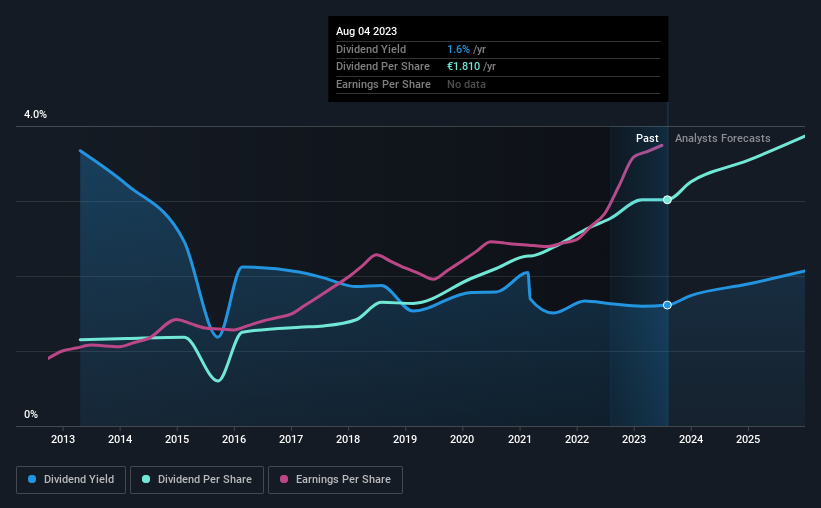- Netherlands
- /
- Professional Services
- /
- ENXTAM:WKL
Wolters Kluwer (AMS:WKL) Has Announced That It Will Be Increasing Its Dividend To €0.72

Wolters Kluwer N.V. (AMS:WKL) has announced that it will be increasing its periodic dividend on the 21st of September to €0.72, which will be 14% higher than last year's comparable payment amount of €0.63. Although the dividend is now higher, the yield is only 1.6%, which is below the industry average.
Check out our latest analysis for Wolters Kluwer
Wolters Kluwer's Earnings Easily Cover The Distributions
Even a low dividend yield can be attractive if it is sustained for years on end. The last dividend was quite easily covered by Wolters Kluwer's earnings. This indicates that quite a large proportion of earnings is being invested back into the business.
Over the next year, EPS is forecast to expand by 16.8%. Assuming the dividend continues along recent trends, we think the payout ratio could be 42% by next year, which is in a pretty sustainable range.

Dividend Volatility
The company's dividend history has been marked by instability, with at least one cut in the last 10 years. Since 2013, the dividend has gone from €0.69 total annually to €1.81. This works out to be a compound annual growth rate (CAGR) of approximately 10% a year over that time. Despite the rapid growth in the dividend over the past number of years, we have seen the payments go down the past as well, so that makes us cautious.
The Dividend Looks Likely To Grow
With a relatively unstable dividend, it's even more important to evaluate if earnings per share is growing, which could point to a growing dividend in the future. Wolters Kluwer has seen EPS rising for the last five years, at 11% per annum. Since earnings per share is growing at an acceptable rate, and the payout policy is balanced, we think the company is positioning itself well to grow earnings and dividends in the future.
We Really Like Wolters Kluwer's Dividend
Overall, a dividend increase is always good, and we think that Wolters Kluwer is a strong income stock thanks to its track record and growing earnings. The company is easily earning enough to cover its dividend payments and it is great to see that these earnings are being translated into cash flow. All of these factors considered, we think this has solid potential as a dividend stock.
Investors generally tend to favour companies with a consistent, stable dividend policy as opposed to those operating an irregular one. Meanwhile, despite the importance of dividend payments, they are not the only factors our readers should know when assessing a company. As an example, we've identified 1 warning sign for Wolters Kluwer that you should be aware of before investing. Looking for more high-yielding dividend ideas? Try our collection of strong dividend payers.
Valuation is complex, but we're here to simplify it.
Discover if Wolters Kluwer might be undervalued or overvalued with our detailed analysis, featuring fair value estimates, potential risks, dividends, insider trades, and its financial condition.
Access Free AnalysisHave feedback on this article? Concerned about the content? Get in touch with us directly. Alternatively, email editorial-team (at) simplywallst.com.
This article by Simply Wall St is general in nature. We provide commentary based on historical data and analyst forecasts only using an unbiased methodology and our articles are not intended to be financial advice. It does not constitute a recommendation to buy or sell any stock, and does not take account of your objectives, or your financial situation. We aim to bring you long-term focused analysis driven by fundamental data. Note that our analysis may not factor in the latest price-sensitive company announcements or qualitative material. Simply Wall St has no position in any stocks mentioned.
About ENXTAM:WKL
Wolters Kluwer
Provides professional information, software solutions, and services in the Netherlands, rest of Europe, the United States, Canada, the Asia Pacific, he United Arab Emirates, and internationally.
Second-rate dividend payer with limited growth.


